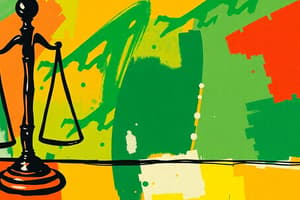Podcast
Questions and Answers
Legal language is known for being concise and straightforward.
Legal language is known for being concise and straightforward.
False (B)
Verbose language in legal drafting is often used to maintain an aura of profound importance.
Verbose language in legal drafting is often used to maintain an aura of profound importance.
True (A)
Lord Radcliffe compared the language of legal drafting to a clear and easily understandable form of communication.
Lord Radcliffe compared the language of legal drafting to a clear and easily understandable form of communication.
False (B)
Judges act as computers when interpreting legislation.
Judges act as computers when interpreting legislation.
The use of legalese reflects a desire to make legal concepts more accessible to the general public.
The use of legalese reflects a desire to make legal concepts more accessible to the general public.
The interpretation of statutes is purely a mechanical exercise based on predetermined formulae.
The interpretation of statutes is purely a mechanical exercise based on predetermined formulae.
Despite efforts to promote plain language in legal drafting, convoluted language still persists in legislation.
Despite efforts to promote plain language in legal drafting, convoluted language still persists in legislation.
Judges are considered legislators when interpreting legislation.
Judges are considered legislators when interpreting legislation.
Legal doublets are pairs of words that convey the same legal concept but in different languages.
Legal doublets are pairs of words that convey the same legal concept but in different languages.
Interpreting legislation does not involve considering constitutional values and fundamental rights.
Interpreting legislation does not involve considering constitutional values and fundamental rights.
The provision must be read, understood, and applied independently of the supreme Constitution and the Bill of Rights.
The provision must be read, understood, and applied independently of the supreme Constitution and the Bill of Rights.
Interpreting legislation is purely a mathematical exercise based on well-known maxims.
Interpreting legislation is purely a mathematical exercise based on well-known maxims.
The interpretation of statutes in South Africa used to be simple and straight-forward, without any confusing maxims or canons.
The interpretation of statutes in South Africa used to be simple and straight-forward, without any confusing maxims or canons.
The acceptance of the new supreme Constitution in South Africa could have been jeopardized if the fundamental rights were not applied properly.
The acceptance of the new supreme Constitution in South Africa could have been jeopardized if the fundamental rights were not applied properly.
A supreme constitution in South Africa is considered a secondary law, below parliamentary legislation.
A supreme constitution in South Africa is considered a secondary law, below parliamentary legislation.
Any legislation or act that conflicts with the South African constitution is considered valid.
Any legislation or act that conflicts with the South African constitution is considered valid.
Constitutional supremacy in South Africa implies that the courts have ultimate authority over the values and principles within the constitution.
Constitutional supremacy in South Africa implies that the courts have ultimate authority over the values and principles within the constitution.
The South African rules of statutory interpretation were traditionally based on the sovereignty of the judiciary.
The South African rules of statutory interpretation were traditionally based on the sovereignty of the judiciary.
Statutory interpretation in South African jurisprudence was not important for many years.
Statutory interpretation in South African jurisprudence was not important for many years.
The intention of the legislature refers to the real intent of the majority of the legislative body at the time of voting.
The intention of the legislature refers to the real intent of the majority of the legislative body at the time of voting.
The draft legislation is formulated by politicians themselves without any input from legal drafters or government advisors.
The draft legislation is formulated by politicians themselves without any input from legal drafters or government advisors.
The rules and principles of statutory interpretation in South Africa were systematically applied during the late 1970s and 1980s.
The rules and principles of statutory interpretation in South Africa were systematically applied during the late 1970s and 1980s.
Correct interpretation of legislation depends on the term used rather than the purpose, intention, or legislative scheme behind it.
Correct interpretation of legislation depends on the term used rather than the purpose, intention, or legislative scheme behind it.
Part 2 of the book discusses in depth how to interpret legislation correctly.
Part 2 of the book discusses in depth how to interpret legislation correctly.
Legislation is considered the most important source of new law in modern societies.
Legislation is considered the most important source of new law in modern societies.
In South Africa, a deep understanding of legislation is not necessary due to the historical legal system.
In South Africa, a deep understanding of legislation is not necessary due to the historical legal system.
Statutory interpretation mainly involves constructing the correct meaning of legislative provisions for practical application.
Statutory interpretation mainly involves constructing the correct meaning of legislative provisions for practical application.
Du Plessis (2002: 18) emphasizes that statutory interpretation does not involve referring to other law-texts.
Du Plessis (2002: 18) emphasizes that statutory interpretation does not involve referring to other law-texts.
Apartheid in South Africa was not influenced by a network of legislation.
Apartheid in South Africa was not influenced by a network of legislation.
Legislative intervention is not seen as necessary for dealing with new technological and scientific advancements.
Legislative intervention is not seen as necessary for dealing with new technological and scientific advancements.
Flashcards are hidden until you start studying




